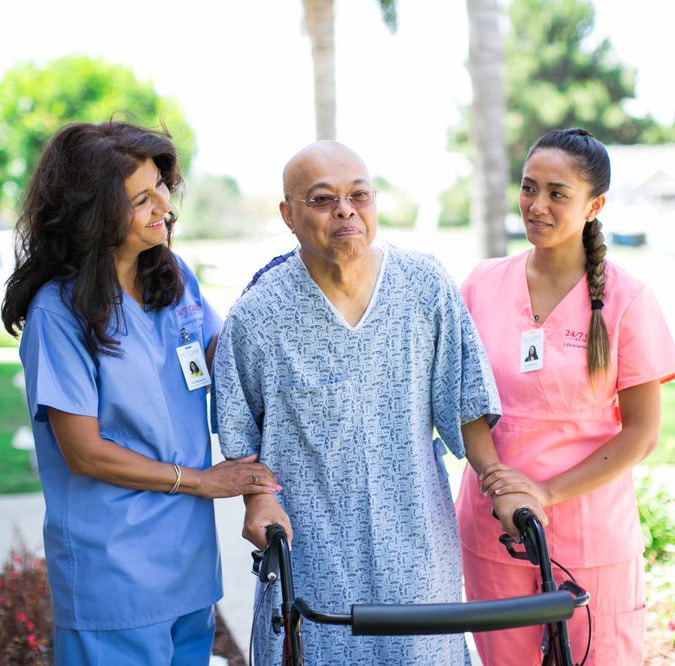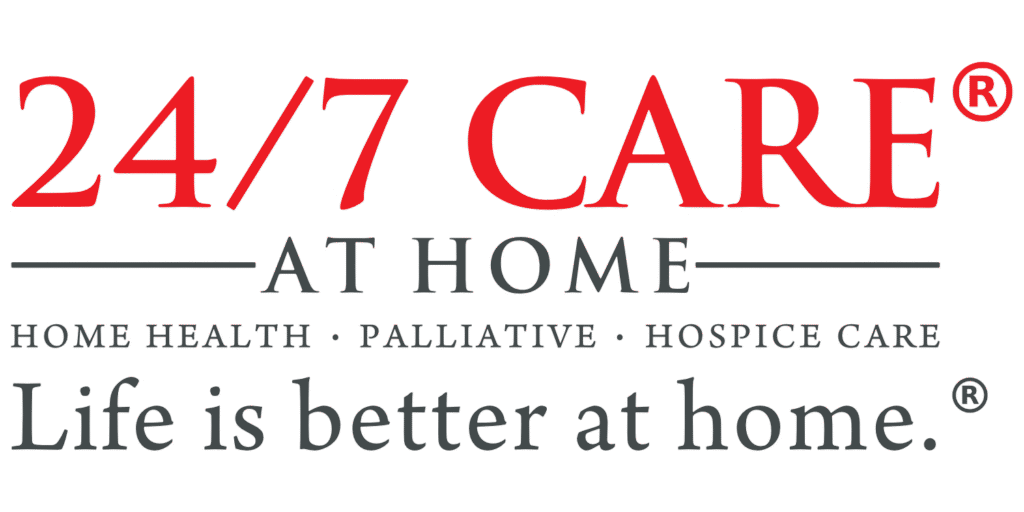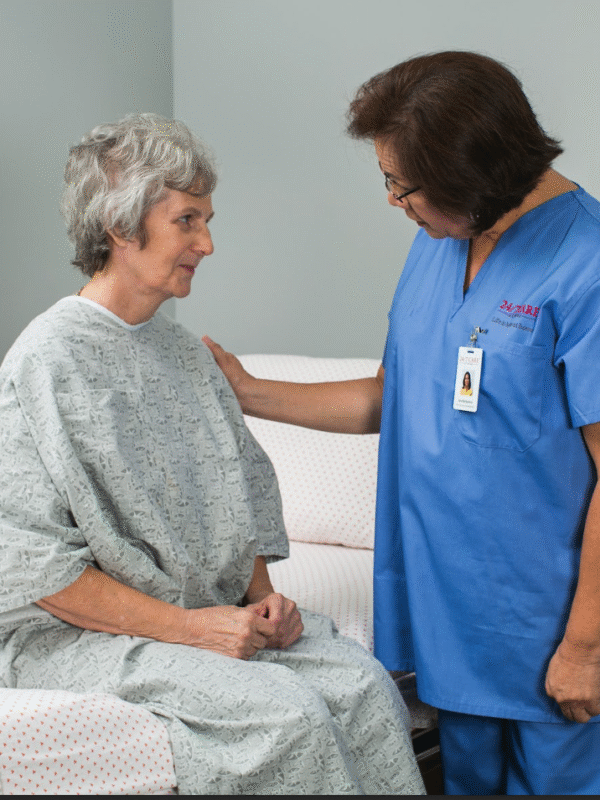Palliative Care in Orange County, CA & Surrounding Areas
Aggressive treatment is not always warranted, especially when the body is weak and feeble; the team at 24/7 Care At Home believes in improving quality of life. If you or a loved one experiences a serious or life-threatening illness, palliative care is crucial. At 24/7 Care At Home, based in Orange County, California, our clinical team offers specialized care for symptom relief and improved quality of life during ongoing medical treatments.
Schedule a palliative care consultation with 24/7 Care At Home by phone today at (714) 881- 4078. We’re standing by to help.
*Same-day admissions are possible. A Doctor’s order is required.
Our Services
Home Health Care
Hospice Care
Palliative Care

Don’t let you or a loved one live with pain, psychological stress, or distress associated with a serious illness. Schedule a palliative care consultation with 24/7 Care At Home by phone today at (714) 881- 4078.



What is Palliative Care
24/7 Care At Home is medical care focused on pain relief and a better quality of life for patients suffering from serious illnesses or diseases. It offers a layer of added support and compliments ongoing medical treatment to ensure you or a loved one remains as comfortable as possible.
What is palliative care used for?
You or a family member can benefit from palliative care if you suffer from a serious illness or disease, such as:
- Dementia
- Cancer
- Cystic fibrosis
- Heart disease
- Bone marrow or blood disorders
- Kidney failure
- End-stage liver disease
- Stroke
- Parkinson’s disease
- Lung disease
- Amyotrophic lateral sclerosis (ALS)
Palliative care offers relief from unpleasant symptoms, like nausea, vomiting, chronic or severe pain, depression, anxiety, and fatigue, as well as constipation, breathing problems, sleeping issues, and anorexia.
What should I expect during palliative care?
The first step of palliative care at 24/7 Care At Home is a comprehensive in-home consultation with the medical team. We’ll review your medical history, current treatment plan, medications, and symptoms and complete a physical exam to personalize your care plan.
Your provider might have you complete blood tests, urine tests, heart function tests, imaging procedures, or other diagnostic tests to monitor your health during palliative care. They work closely with specialists to ensure you or a loved one receives optimal care.
Which treatments are available?
Palliative care may consist of the following treatments:
- Nutritional guidance
- Medications
- Occupational therapy
- Physical therapy
- Integrative therapies
- Support groups
- Counseling
- Specialist referrals
During treatment, you or a loved one receives symptom management, counseling, support, and advice. The 24/7 Care At Home team can connect you with a palliative care chaplain, social worker, dietitian, psychologist, massage therapist, physical therapist, advanced directive specialist, or other team members with helpful information.
What is the outlook with palliative care?
The goal of palliative care is to keep you or a loved one comfortable during ongoing treatment. While some patients recover after being diagnosed with a serious or life-threatening illness, others do not. The team at 24/7 Care At Home gives you a better idea of what the expected outcome looks like based on the severity of your condition.
Don’t let you or a loved one live with pain, psychological stress, or distress associated with a serious illness.
Schedule a palliative care consultation with 24/7 Care At Home by phone today at (714) 881- 4078.





What is the eligibility for Palliative Care?
Palliative care is begun at the discretion of the physician and patient at any time, at any stage of illness, terminal or not.
Your prognosis must be greater than 6 months.
You are not identified by your doctor as terminally ill.
You or your family is not emotionally ready for hospice
You want aggressive oriented treatment
Meet Your 24/7 Care at Home Palliative Care Team
Life is Better at Home
At 24/7 Care at Home, we understand that living with a serious illness presents unique challenges. Our dedicated Palliative Care Team is here to provide compassionate, comprehensive support aimed at enhancing comfort and improving quality of life because we truly believe that life is better at home.
Our Compassionate Palliative Care Professionals Include:
Palliative Care Physicians
Oversee and coordinate your individualized care plan, ensuring treatments align with your medical needs and personal goals. They collaborate closely with your existing healthcare providers to deliver seamless, well-coordinated care.
Nurse Practitioners (NPs)
Specialize in managing pain and other distressing symptoms, providing hands-on care, and educating patients and families about treatment options. They work diligently to enhance your comfort and empower you to make informed decisions about your care.
Medical Social Workers
Offer emotional support, assist with advance care planning, and connect you with community resources to address social, financial, and logistical challenges. They are dedicated to helping you and your family navigate the complexities of serious illness with confidence and peace of mind.
Palliative Care Frequently Asked Questions
What is palliative medicine?
Palliative medicine is a medical subspecialty provided by doctors who offer palliative care for people who are seriously ill. Palliative care relieves suffering and improves quality of life for people of any age and at any stage in a serious illness, whether that illness is curable, chronic, or life-threatening.
What’s the difference between palliative care and hospice care?
Palliative care is whole-person care that relieves symptoms of a disease or disorder, whether or not it can be cured. Hospice is a specific type of palliative care for people who likely have 6 months or less to live. In other words, hospice care is always palliative, but not all palliative care is hospice care. Hospice is comfort care without curative intent; the patient no longer has curative options or has chosen not to pursue treatment because the side effects outweigh the benefits. Palliative care is comfort care with or without curative intent.
What is the eligibility for Palliative Care?
Palliative care is begun at the discretion of the physician and patient at any time, at any stage of illness, terminal or not.
- Your prognosis must be greater than 6 months
- You are not identified by your doctor as terminally ill
- You or your family is not emotionally ready for hospice
- You want aggressive oriented treatment
Who provides palliative care?
Palliative care is provided by an interdisciplinary team that may include a doctor who specializes in palliative medicine, a nurse, pharmacist, social worker, dietitian, and volunteers. They address physical, emotional and spiritual pain, including such common worries as loss of independence, the well-being of the family and feeling like a burden.
What does a palliative doctor do that’s different from what my other doctors do?
Your other doctors focus on your general health or treating your disease or condition. Palliative doctors concentrate on preventing and alleviating suffering, improving your quality of life, and helping you and your loved ones cope with the stress and burden of your illness.
Shouldn’t all my doctors be concerned with alleviating my suffering and improving my quality of life?
Yes. Palliative doctors have special training and expertise in pain management and symptom control, and specialize in helping patients and their families cope with the many burdens of a serious illness, from the side effects of a medical treatment to caregiver stress to fears about the future. Palliative doctors can assist you with difficult medical decisions, helping you weigh the pros and cons of various treatments.
If I receive palliative or hospice care, will I still be able to see my personal doctor?
Absolutely. Your palliative doctor coordinates care with your other doctors and helps you navigate the often-complex healthcare system.
If I agree to palliative care, does that mean I’m “giving up?”
Not at all. The goal of palliative care is to make you comfortable and help you achieve the best possible quality of life. You can have palliative care while you are undergoing treatments that may cure or reverse the effects of your illness. In fact, palliative care can help you cope with aggressive treatments by getting your pain and symptoms under control to help you fight the disease.
How can I find palliative care?
Palliative care can be provided at a hospital, a nursing home, an assisted-living facility, or at home. There are a number of ways to find a doctor who specializes in palliative medicine, including asking your personal doctor to refer you to a palliative doctor or asking your local hospital if they have a palliative specialist.
How do I know that I’m receiving the most beneficial or appropriate treatment?
Palliative doctors are concerned about you as a whole person—not just the part of you that is sick. They understand that people with serious illnesses can be frightened and unsure of themselves when making medical decisions. They also understand that there is not always one right or wrong answer and that your needs and wishes may change over time. Palliative doctors consider all of this when they help you develop your treatment plan.
Does insurance cover palliative care or hospice?
Many private insurance companies and health maintenance organizations (HMOs) offer palliative care and hospice benefits. Medicare (mostly for people 65 and older) offers hospice benefits, and the extra Medicare plan (Part B) offers some palliative care benefits. Medicaid coverage of hospice and palliative care for people of limited incomes varies by state.


